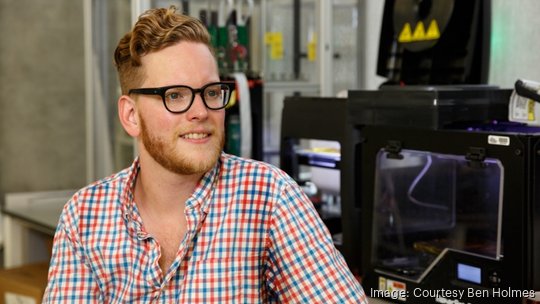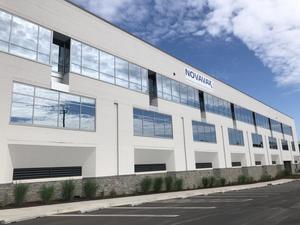
D.C. medical device startup Nanochon Inc. has raised a chunk of money to start clinical trials for its 3D-printed knee implant, just a precursor to a larger haul it will need to get its product to market.
The company said this week it has raised $4 million to kick off a phase 1 study for its orthopedic device, a patented implant called Chondrograft. And it expects to go after an additional $20 million to fund a subsequent trial — which, if successful, would position it for a regulatory approval and, potentially, an exit, said co-founder and CEO Ben Holmes.
“The first human clinical data is one of the most important, if not the most important milestone for a medical device,” Holmes told me. “It shows the true benefit to the patient and helps solidify the vision for the technology as a treatment in the clinic and a product on the market.”
The University of Virginia’s Licensing and Ventures Group Seed Fund, an existing Nanochon investor, led the $4 million round. Grand Rapids, Michigan-based Cultivate(MD), Morgantown, West Virginia-based Mountain State Capital and other investors also participated. The latest infusion brings Nanochon’s lifetime funding to nearly $12 million, including $1 million in nondilutive capital.
Nanochon is already putting the fresh $4 million to work. With just a handful of employees, it has brought on a clinical senior consultant to oversee the trials, and a chief of strategy to handle marketing, branding, fundraising and partnerships, Holmes said.
It’s now preparing to start the first trial in the fourth quarter. Participants would include adults under age 60 who have moderate, but not severe, knee trauma, and are therefore considered “pre-knee replacement,” Holmes said.
The company would then look to run a two-year trial, known as a pivotal study, which would arm it with the data it needs to seek approval from the Food and Drug Administration. If it goes according to plan, Holmes said, Nanochan would be looking to get its implant to market in 2028.
That launch would come later than originally planned; Nanochon had previously targeted early 2023 to begin trails. But “it took longer than normal to raise this round,” Holmes told me, pointing to the challenging funding climate in recent years. Nanochon has since pivoted its plans for the trial, now slated to take place within the U.S. rather than outside, to avoid what might result in a longer approval process, he said.
The end game for Nanochon, Holmes said, is an eventual exit. He would hope to sell the business to a larger industry player for roughly $500 million to $600 million, “close to or at the point of FDA approval,” he said. But, he added, the company is preparing to launch the product and might opt to operate with it on the market for a few initial years, to “show the most value.”
Holmes has been vocal over the years about that goal to follow the likes of CartiHeal Inc., which sold in 2021 to Bioventus LLC for $500 million, and Cartiva Inc., which sold to Wright Medical Group NV in 2018 for $435 million. “These are both companies that essentially were doing exactly what we’re trying to do,” Holmes told me in December 2021.
Nanochon is marketing its Chondrograft device as an option for young and active patients with joint damage to avoid full knee replacement surgery. That group includes athletes ages 20 to 50 developing knee problems because of sports injuries or accidents, or who suffer from early cartilage loss.
The device is implanted through minimally invasive surgery, and is designed to help the body regrow damaged cartilage and bone. It serves to address a few challenges associated with full knee replacement, by shortening recovery time and expanding access to what Nanochon bills as a lower-cost alternative.
While a full knee replacement surgery can cost anywhere from $25,000 to $50,000 and require up to a year of recovery, Holmes said, the company expects surgery with its product to cost $15,000 to $20,000 all in. It plans to retail the full device system — the tools and devices needed for one patient — at a comparable price point to that of a traditional knee replacement.
The company is also looking to expand into other areas of joint replacement, including ankle, hip and shoulder, Holmes said.
Nanochon, one of the Washington Business Journal's Startups to Watch in 2021, licenses its technology from George Washington University. Holmes and co-founder Nathan Castro, who both earned doctorates from GWU, started the company in 2014.




